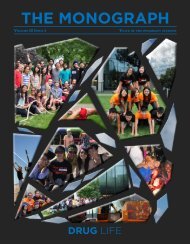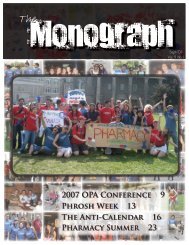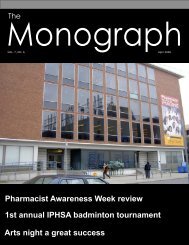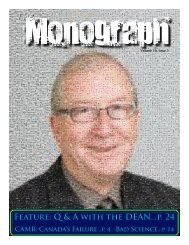March/April - University of Toronto's Undergraduate Pharmacy Society
March/April - University of Toronto's Undergraduate Pharmacy Society
March/April - University of Toronto's Undergraduate Pharmacy Society
Create successful ePaper yourself
Turn your PDF publications into a flip-book with our unique Google optimized e-Paper software.
4 th Year Anti-<br />
Calendar<br />
By: Milson Chan, 1T0 Monograph Rep.<br />
<br />
*Thanks to the following people for their very useful<br />
contributions: Humphrey Cheung, Hayley Fleming,<br />
Peter Ji, Nadine Lam, Richard McLaughlin, Laura<br />
Narducci, Aron Quah, Santhosh Sekharan, and Yuan<br />
Zhou, without whom this would have never been<br />
finished.<br />
Dear 1T1s,<br />
Welcome to 4 th year, because I am sure<br />
all <strong>of</strong> you will pass the final exams in 3 rd<br />
year if you read the anti-calendar I wrote<br />
last year. So I hope this guide will serve the<br />
same purpose by giving you some insights<br />
about which electives to take and how to<br />
do well in your final year that will go by<br />
before you know it.<br />
PHM421Y1 Pharmaceutical Care III<br />
Coordinators: Lalitha Raman-Wilms and<br />
Gary Wong<br />
The format is similar to 3 rd year<br />
therapeutics except the topics are being<br />
covered at a faster pace because there are<br />
usually 2 to 3 cases per week. Most <strong>of</strong> the<br />
topics are very useful and informative,<br />
focusing mainly on cardiology and<br />
psychiatric disorders. There are also only<br />
2 CSS (7.5% each) in the term but they<br />
seem a bit longer than the ones in 3 rd year,<br />
especially the one in CHF which requires<br />
quite a bit <strong>of</strong> detail. There is only 1 midterm<br />
(35%) and 1 final exam (40%) in this<br />
course. Much like 3 rd year, the final will<br />
showcase an oral component that will make<br />
up most <strong>of</strong> your mark so make sure you are<br />
familiar with the topics that they like. The<br />
multiple choice questions seem short but<br />
they require you to know the details <strong>of</strong> the<br />
topics very well. Pr<strong>of</strong>essor Raman-Wilms,<br />
the pr<strong>of</strong>essor <strong>of</strong> the year, is very helpful as<br />
she guides you through the term with all<br />
the key point summaries. Make sure you<br />
spend a lot <strong>of</strong> time in this course in order to<br />
maximize your learning.<br />
PHM425H1 <strong>Pharmacy</strong> Practice<br />
Research<br />
Coordinator: Marcio Machado<br />
This course covers the basic ideas <strong>of</strong><br />
research methodologies and designs that<br />
are relevant to pharmacy practice and the<br />
overall difficulty is not very high. The<br />
mid-term is very straight forward and the<br />
final exam is fair. But the majority <strong>of</strong> your<br />
grade comes down to the research protocol<br />
so make sure you choose good and reliable<br />
group members because it will make your<br />
life much easier. You will have to work<br />
together to finish a proposal, literature<br />
review, and presentation but remember that<br />
you can always change some <strong>of</strong> the details<br />
<strong>of</strong> your study along the way. However, the<br />
final protocol is individual work and is<br />
due during exam time. So to avoid major<br />
confusion, anxiety, and paranoia, make<br />
sure you know what is going on with<br />
your research protocol as the deadline<br />
approaches.<br />
PHM427H1 Health Systems in <strong>Society</strong><br />
II<br />
Coordinator: Linda MacKeigan<br />
This is a continuation <strong>of</strong> health system<br />
course in second year. The first part <strong>of</strong><br />
the course covers some <strong>of</strong> the issues and<br />
topics <strong>of</strong> the health care system related to<br />
pharmacy practice and second half focuses<br />
only on pharmacoeconomics. There is a<br />
writing assignment that will assess your<br />
writing skill and critical thinking ability.<br />
It will also let you know why you are not<br />
going to do well in the mid-term because<br />
you will need to provide specific responses<br />
to somewhat general questions in order to<br />
do well. If you do poorly in the mid-term,<br />
they will let you know that second half <strong>of</strong><br />
the course is very different. That is true,<br />
except that means that you may do even<br />
worse. To avoid that, you should familiarize<br />
yourself with the tutorial readings in order<br />
to salvage some mark in the quizzes. Also,<br />
since the second half is a bit more scientific<br />
and technical, and the paper that you will<br />
need to appraise in the final exam is given<br />
ahead <strong>of</strong> time, you should know it well as<br />
to how it relates to the lecture notes.<br />
PHM428H1 Pr<strong>of</strong>essional Practice IV<br />
Coordinator: Zubin Austin<br />
This course is taught by pr<strong>of</strong>essor<br />
<strong>of</strong> the year Zubin Austin. This is a very<br />
interesting series <strong>of</strong> lectures that will<br />
give you a different view into your future<br />
practice. You will be exposed to mainly<br />
patient psychology and tort law. The<br />
classes are informative and fun but make<br />
sure you understand the examples and ideas<br />
discussed in class for exam purposes since<br />
there is application aspect in the exam. This<br />
is overall a very enjoyable course with a<br />
light workload.<br />
PHM429 <strong>Pharmacy</strong> Practice Seminar<br />
Coordinator: Debra Moy<br />
This is the 4 th and final installment<br />
<strong>of</strong> the PPL series, put together by yet<br />
another pr<strong>of</strong>essor <strong>of</strong> the year, Debra<br />
Moy, who is great at providing help for<br />
students which may be important because<br />
this course is definitely more challenging<br />
than the one in 3 rd year. There are no more<br />
technical aspects <strong>of</strong> dispensing, checking<br />
prescriptions, taking verbal prescriptions.<br />
It is purely based on patient interactions<br />
with standardized actors, who can be quite<br />
good at acting so you will have to put your<br />
superior counseling skills to use. Although<br />
you can bring a suitcase containing all your<br />
favorite reference books with you to the<br />
lab, it is still important to prepare by going<br />
over the pre-lab questions and knowing the<br />
given topic well. Make sure you answer all<br />
the questions that patients have and manage<br />
your time accordingly. If you do fail, learn<br />
from it so that you will not make the same<br />
mistakes again. If you do that, you should<br />
get better towards the end <strong>of</strong> the course<br />
because after all, there are only so many<br />
things that can go wrong … right?<br />
Compulsory-electives:<br />
Note: Students must choose to take 1<br />
<strong>of</strong> the following 3 courses as an elective<br />
PHM454H1 Selected Topics in<br />
Pharmaceutical Industry<br />
Coordinator: Rami Batal<br />
This was Rami Batal’s first year as<br />
a pr<strong>of</strong>essor, but he’s not new to the field<br />
<strong>of</strong> teaching especially when it comes to<br />
the industry. Other guest lecturers include<br />
a pharmacist, a former neurosurgeon,<br />
a founder and president <strong>of</strong> a biotech<br />
company, and more. Pr<strong>of</strong>essor Batal’s style<br />
<strong>of</strong> teaching is very interactive and engaging.<br />
The concepts are better understood when<br />
you simply listen and participate in the class<br />
discussions since class participation is also<br />
part <strong>of</strong> the evaluation. You will participate<br />
in mini-presentations and “workshops”, as<br />
well as dressing-to-impress since there is a<br />
dress code for the class. Both the midterm<br />
and final exam cover a fair amount <strong>of</strong><br />
The Monograph - <strong>March</strong> 2010 13
















